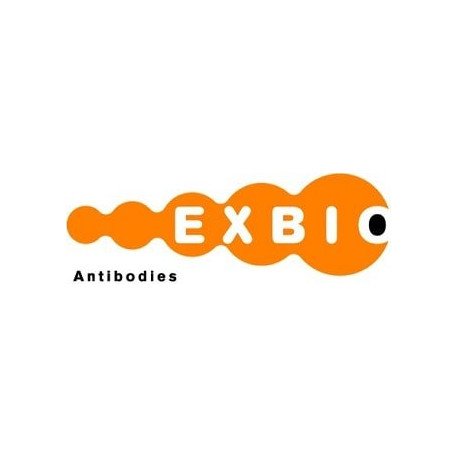Cart 0 Product Products (empty)
No products
To be determined Shipping
0,00 € Total
Prices are tax excluded
Product successfully added to your shopping cart
Quantity
Total
There are 0 items in your cart. There is 1 item in your cart.
Total products (tax excl.)
Total shipping (tax excl.) To be determined
Total (tax excl.)
Data sheet of Mouse Monoclonal to Lck
| Brand | Exbio |
| Product type | Primary antibodies |
| Reactivity | Human |
| Clonality | Monoclonal |
More info about Mouse Monoclonal to Lck
| Brand: | Exbio |
| Product no.: | 11-269-C025 |
| Product type: | Primary antibodies |
| Host species: | Mouse |
| Product name: | Mouse Monoclonal to Lck |
| Antigen: | Lck |
| Clonality: | Monoclonal |
| Negative species: | Mouse |
| Clone: | LCK-01 |
| Isotype: | IgG1 |
| Immunogen: | Peptide corresponding to amino acids 22-36 in the sequence of human Lck. |
| Format: | purified |
| Specificity: | The antibody LCK-01 recognizes defined epitope (aa 22-36) of Lck, a 56 kDa Src-family protein tyrosine kinase. |
| Categories: | Phosphorylation (Kinases, Phosphatases, Phosphotyrosine) (Human), Phosphorylation (Kinases, Phosphatases, Phosphotyrosine) |
| Concentration: | 1 mg/ml |
| Storage buffer: | Phosphate buffered saline (PBS) with 15 mM sodium azide, approx. pH 7.4 |
| Storage / stability: | Store at 2-8°C. Do not freeze. Do not use after expiration date stamped on vial label. |
| Background: | Lck is a Src-family tyrosine kinase, which is essential for signaling through the T-cell receptor (TCR) complex. Upon TCR triggering, Lck phosphorylates the ITAM motives in its zeta subunits, establishing binding sites for the SH2 domains of the tyrosine kinase ZAP70, which is also phosphorylated by Lck and thereby activated to generate subsequent signaling platforms by phosphorylation of adaptor LAT. Whereas the majority of Lck is localized to the plasma membrane, there is also a significant fraction associated with the Golgi apparatus, which may contribute to Raf activation under conditions of weak stimulation through the TCR. Lck is also involved in the regulation of apoptosis induced by various stimuli, but not by the death receptors. |
| Purity: | > 95% (by SDS-PAGE) |
| Purification: | Purified by protein-A affinity chromatography |
| Product specific references: | *Brdicková N, Brdicka T, Angelisová P, Horváth O, Spicka J, Hilgert I, Paces J, Simeoni L, Kliche S, Merten C, Schraven B, Horejsà V: LIME: a new membrane Raft-associated adaptor protein involved in CD4 and CD8 coreceptor signaling. J Exp Med. 2003 Nov 17;198(10):1453-62., *Meraner P, Horejsà V, Wolpl A, Fischer GF, Stingl G, Maurer D: Dendritic cells sensitize TCRs through self-MHC-mediated Src family kinase_x000D_ activation. J Immunol. 2007 Feb 15;178(4):2262-71._x000D_ , *Romagnoli P, Strahan D, Pelosi M, Cantagrel A, van Meerwijk JP.: A potential role for protein tyrosine kinase p56(lck) in rheumatoid arthritis synovial fluid T lymphocyte hyporesponsiveness. Int Immunol. 2001 Mar;13(3):305-12. _x000D_ , *Cebecauer M, Cerny J, Horejsi V.: Incorporation of leucocyte GPI-anchored proteins and protein tyrosine kinases into lipid-rich membrane domains of COS-7 cells. Biochem Biophys Res Commun. 1998 Feb 24;243(3):706-10. _x000D_ |
| General references: | *Li M, Ong SS, Rajwa B, Thieu VT, Geahlen RL, Harrison ML: The SH3 domain of Lck modulates T-cell receptor-dependent activation of extracellular signal-regulated kinase through activation of Raf-1. Mol Cell Biol. 2008 Jan;28(2):630-41._x000D_ _x000D_ , *Kim MJ, Park MT, Yoon CH, Byun JY, Lee SJ: Activation of Lck is critically required for sphingosine-induced conformational activation of Bak and mitochondrial cell death. Biochem Biophys Res Commun. 2008 May 30;370(2):353-8._x000D_ _x000D_ , *Lovatt M, Filby A, Parravicini V, Werlen G, Palmer E, Zamoyska R: Lck regulates the threshold of activation in primary T cells, while both Lck and Fyn contribute to the magnitude of the extracellular signal-related kinase_x000D_ response. Mol Cell Biol. 2006 Nov;26(22):8655-65._x000D_ _x000D_ , *Hur YG, Yun Y, Won J: Rosmarinic acid induces p56lck-dependent apoptosis in Jurkat and peripheral T_x000D_ cells via mitochondrial pathway independent from Fas/Fas ligand interaction. J Immunol. 2004 Jan 1;172(1):79-87._x000D_ _x000D_ _x000D_ , *Gruber C, Henkel M, Budach W, Belka C, Jendrossek V: Involvement of tyrosine kinase p56/Lck in apoptosis induction by anticancer drugs. Biochem Pharmacol. 2004 May 15;67(10):1859-72._x000D_ _x000D_ _x000D_ , *Denny MF, Kaufman HC, Chan AC, Straus DB: The lck SH3 domain is required for activation of the mitogen-activated protein kinase pathway but not the initiation of T-cell antigen receptor signaling. J Biol Chem. 1999 Feb 19;274(8):5146-52._x000D_ _x000D_ _x000D_ |
| Related products: | - Mouse Monoclonal to LST1 - Mouse Monoclonal to LIME - Mouse Monoclonal to LIME (mouse) |
| Shipping condition: | Room temperature |


